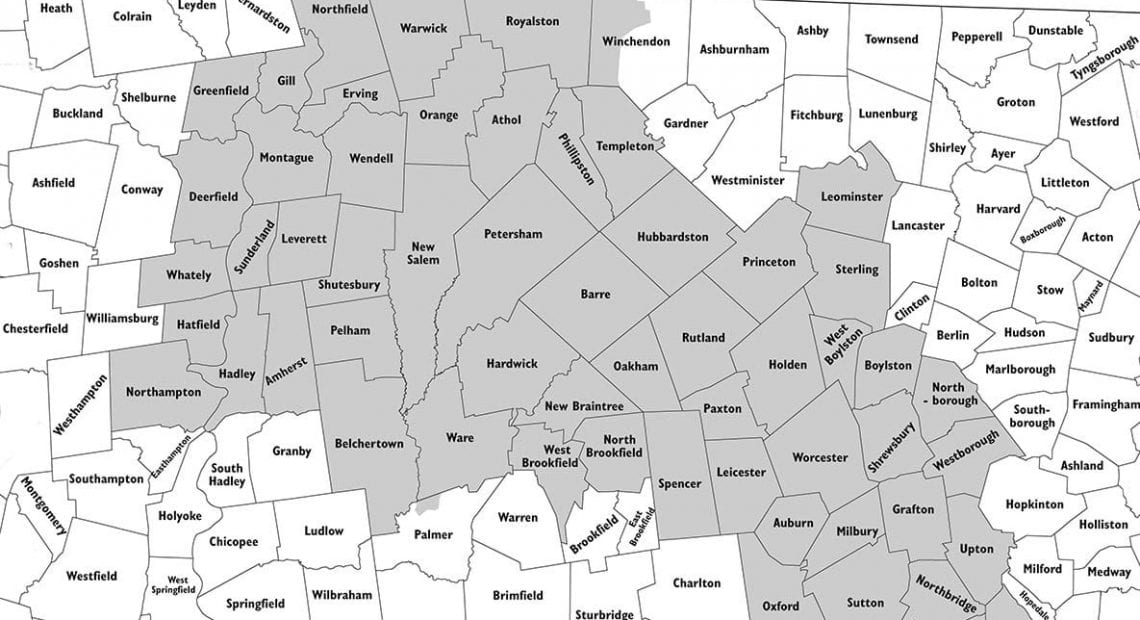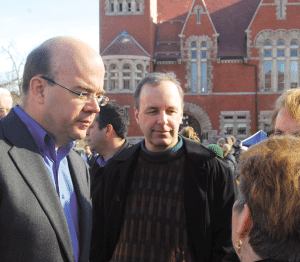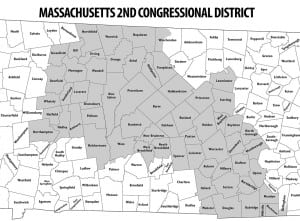
Altered States
McGovern Adjusts to a Greatly Changed District
Congressman Jim McGovern was talking about how to spur economic development and job creation in some of the Hampshire, Franklin, and Worcester County communities that are now part of his territory — a significantly reworked Second District — and he started by going back to a speech he gave before the Worcester Chamber of Commerce roughly a year after he was first elected to the House in 1996.This was to be a candid talk — one he feared might be a little too candid.
“I thought I’d get booed out of the hall,” he recalled with a laugh, adding that he was essentially telling those assembled that they were wandering aimlessly in their pursuit of progress, and thus underperforming. “I said, ‘economic development here reminds me of my then-3-year-old son’s soccer team; if someone kicks the ball to the left, they all run to the left, and if someone kicks it to the right, they all head to the right — no one knows what their position or assignment is.’
“I said there was no logic behind what we were doing here — we’re simply not connecting the dots,” he went on. “And a number of people came up to me later and said, ‘we agree — there’s no plan here; there’s no thought being given to economic development.’”
Over the next several years, Worcester and its officials put some thought into it, he told BusinessWest, adding that, as a result, progress has been made in several areas, from significant growth of sectors like the biosciences and medical-device manufacturing to reinvigoration of Worcester Airport, which will be a stop for JetBlue starting in the fall (more on all of this later).
It all happened through creation of plans and establishment of partnerships with a host of constituencies, from local colleges and universities to private developers, to make them reality, he said, adding that he will work to take some of the lessons learned in Worcester and other communities he’s served, and apply them in cities and towns he might have needed Mapquest to find before late last year.
Indeed, McGovern was probably the congressman most impacted by last year’s massive statewide redistricting effort, facilitated, in some respects, by the retirement of John Olver, whose old First District was essentially parceled out to McGovern and Richard Neal, who formerly represented a much different Second District and also added a host of new communities to his territory.
McGovern’s former district (the Third) included Worcester, his birthplace and political base, near its west boundary, and swept like a giant apostrophe to the south and east, all the way to Fall River. Now, Worcester is near the eastern end of a district that winds through five counties, the Quabbin Reservoir, and 63 cities and towns (he formerly had only 28), including ones that border Rhode Island, Connecticut, New Hampshire, and Vermont.
“It’s quite a change — I have a lot of learning to do,” he said, adding quickly that this is an ongoing process that has really just begun.
His said his assignment going forward is to continue visiting those 63 communities, learning about both common and specific challenges, and then create some plans — as he helped draft in Worcester — to address matters such as bolstering the agriculture and tourism sectors and finding new uses for the millions of square feet of idle old mill space in Athol, Orange, Palmer, Ware, and many other communities.
But perhaps his overriding mission, he went on, is to disprove some comments from an anonymous reader posted at the end of a story in one of the local papers announcing the results of redistricting. McGovern didn’t have the exact wording on that missive, but he could effectively paraphrase.
“‘We got screwed,’ this person wrote,” he told BusinessWest, adding that he or she went to to say, “‘what the hell is a big-city Worcester politician going to care about what goes on here in the Pioneer Valley?’”
To prove this individual wrong, McGovern, consistently ranked among the most liberal congressmen in the country, said he knows he has to be visible and accessible — and he’s already doing that, through numerous visits to the area and the opening of a district office on Pleasant Street in Northampton — but he also has to be active and accountable, and create progress on the most overriding issue facing every city and town in the Commonwealth: jobs.
For this issue, BusinessWest talked at length with McGovern about what he’s learned through several months of discussions with his new Western Mass. constituents, and how he plans to incorporate lessons learned in Worcester, Fall River, and elsewhere to his work in the 413 area code.
Progress Report
It’s called Gateway Park at WPI.
That’s the name put on ambitious project in downtown Worcester that speaks, in general terms, to the progress made after McGovern’s aforementioned speech to the city’s Chamber of Commerce.
Originally developed as a joint venture with the Worcester Business Development Corp., the park is now solely owned by Worcester Polytechnic Institute. Now in stage 2 of development, its flagship complex is the 125,000-square-foot Life Sciences and Bioengineering Center, which opened in 2007 and is fully occupied with graduate research laboratories, life-sciences companies, state-of-the-art core facilities, and WPI’s Corporate and Professional Education division. The strategic plan eventually calls for five buildings on this site.
The park is perhaps the most significant of the many positive steps Worcester has taken over the past 15 years, said McGovern, adding that it exemplifies the basic approach he embraces when it comes to economic development and job creation. Summing it up, he said it comes down to putting a firm strategic plan in place — in this case, Worcester’s commitment to building its life-sciences sector — and creating partnerships to make it reality.
The same pattern was followed in Fall River and a property now known as the Narrows Center for the Arts, he said, referencing the 280-seat facility, built on the top floor of an old mill building, that hosts national and local performing and visual artists, musicians, writers, and performers.
“They took an abandoned factory and turned it into a spot where some of the top musicians in the country come to play,” he said. “People from all around the region come to attend these concerts, and when they do, they eat at the local restaurants, sometimes they spend the night, they might go shopping beforehand, they attend the local festivals; it all helps out.”
Successes of this magnitude will be difficult to replicate in rural Hampshire and Franklin counties, but McGovern believes he can take the same basic approach and spur economic development in some of the communities he’s now representing.
Getting to know and understand these communities — while also disproving that anonymous commentary mentioned earlier — is the latest career challenge for McGovern, who described his 1996 victory over Republican incumbent Peter Blute as “surprising.”
It came two years after his first bid for Congress while working as a senior aide to long-time Rep. Joe Moakley, in which he lost a crowded Democratic primary. He’s faced only sporadic opposition since, while cementing himself as one of Washington’s most liberal lawmakers and making a mark in areas ranging from transportation to education to nutrition. He currently serves on the powerful Rules Committee, and also on the House Committee on Agriculture.
Since last fall, McGovern has been spending significant amounts of time getting to know his new district and the people who call it home. “Trying to learn all that I need to learn and know all that I need to know is like drinking water from a fire hose — it’s a lot of stuff, and every community is unique.”
He said it’s been a learning experience on many levels.
“People out here take their politics seriously,” he said, referring specifically to the Hampshire and Franklin County portions of his district, which also includes one precinct in Palmer, which is in Hampden County. “They care passionately about the issues, and I’ve had some of the most candid and interesting conversations ever in this part of the district.”
He said his previous district was created to benefit a Republican (Blute), and was therefore more conservative than this new Second District, which includes, in Amherst and Northampton, some of the most liberal communities in the entire state, but also has many conservative pockets as well.
“There’s a little bit of everything — moderate, liberal, Tea Party,” he said with a laugh. “Between Worcester and Franklin County, there are pockets of everything, which keeps life interesting; every day is a learning experience.”
One thing McGovern said he’s already learned is that this region is, by his estimation, “a hell of a lot more coordinated than Worcester was 10 years ago.” Elaborating, the said the Economic Development Council of Western Mass. the Pioneer Valley Planning Commission, and other agencies have identified challenges and opportunities, and have undertaken a number of coordinated initiatives to spark economic development.
“There are good things happening here,” he said. “The challenge for me is to plug into what’s going on and figure out how I can help.”
The Job at Hand
With such a large, spread-out district (compared to everyone but Neal, who represents all of Berkshire County and all but the Palmer precinct in Hampden County), McGovern said he has to maximize his time and carefully plan out his schedule.
He explained that, if he has three days to spend in the district, for example, he’ll spend one in each area: west (Northampton), east (Worcester), and northeast (Leominster).
And while visiting Western Mass. cities and towns, McGovern said he’s learned that the challenges and concerns are pretty much the same as they are across the state. Specifically, the main priority is jobs, and in many communities that were former manufacturing centers, this means reinventing themselves into something else, while also looking at new kinds of manufacturing, different from the paper and textile making that once dominated the scene.
“The one common thread I see and hear in all parts of my district is people worried about their economic security,” he told BusinessWest. “They’re worried about jobs. There’s a good deal of support for reinvigorating our manufacturing base and also support for training programs for displaced workers in the region, because a number of people have lost their jobs in this difficult economy. There’s also a lot of talk about energy-efficiency and renewable-energy projects.”
In Worcester, the process of creating that proverbial something else would never be described as easy, and it is very much still ongoing, said McGovern, but it was greatly facilitated by planning and the many colleges and universities that call that city home, including Assumption, Clark, Holy Cross, Worcester State University, WPI, and UMass Medical School, among others. These collaborations have involved from biosciences to renewable energy.
“I’m proud of what we’ve accomplished in Worcester — we’ve established some collaborations that have made a difference,” referencing projects ranging from Gateway Park to a revitalized Union Station and the Canal District surrounding it; from the airport to reinvigoration of depressed neighborhoods. “A friend of mine who hadn’t been to Worcester in seven years visited recently and couldn’t believe how much had changed and how much new construction was going on; we’re building every day.”
The many colleges in the Amherst/Northampton area, and especially UMass Amherst, can play a similar role, said the congressman, adding that one of his goals is to continue to expand the relationship-building efforts between the university and the communities that surround it to stimulate new business opportunities — and jobs.
“In some states, the natural resources are the minerals in the ground,” he said. “Here, the natural resources are the educational institutions, the colleges. We have all these knowledge-based institutions in the Pioneer Valley that complement and coordinate very well with the schools we have in Worcester. There are opportunities for collaboration that would benefit both areas.”
Meanwhile, in the more rural areas of Hampshire and Franklin counties, agriculture remains a key component of the economy, and McGovern said this makes his seat on the Agriculture Committee more relevant and important. And while working to sustain and perhaps grow agriculture-related businesses, he wants to examine new business opportunities in some of these rural communities, including different options in manufacturing, reuse of the old mills still dominating the landscape, and bolstering tourism, much as Fall River has done through efforts to revitalize its waterfront district.
“It all begins with vision and thinking outside the box,” he said, referring specifically to finding new uses for old mills, but also to economic development in general. “There is a need for housing across the state, and maybe some of these old mills can be redeveloped for that purpose, but also for business development, a supermarket, light manufacturing, and more.”
When it comes to tourism, awareness of what this region and others have to offer, or lack thereof, is part of the problem — and the challenge moving forward, he said, adding that most other sections of the country do a much better job of promoting their tourism assets.
In each community, and with each initiative, the key is to have a plan, or specific strategic direction, said McGovern, returning once again to Worcester and Gateway Park.
“With that initiative, we all sat in a room together, had a conversation about what we were going to do, and then took assignments,” he recalled. “It takes a plan, and what Worcester was lacking was a vision; the ingredients were there to make incredible things happen — what was needed was vision and a plan.”
Summing Up
Those same ingredients are needed in many of the Western Mass. communities that McGovern now counts within his district. Helping put them together is one of the primary items on his to-do list, along with taking initiatives already in progress and moving them forward through partnerships.
“Most all of the challenges we’re facing are not going to be solved by the federal government alone, or the state government alone, or the local government alone, or the private sector alone,” he concluded. “It’s going to involve partnerships and collaborations, and I think I’ve been pretty good at those things.”
But perhaps the most pressing matter is to disprove the comments from that anonymous reader concerned about what a Worcester-based Congressman can do in the Pioneer Valley.
If he can succeed with the former, McGovern said, he knows that the latter will essentially take care of itself.
George O’Brien can be reached at [email protected]







